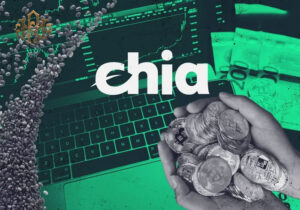
Close



Chia Digital Currency In the rapidly evolving digital currency landscape, Chia (XCH) has emerged as a pioneering digital currency, promising to revolutionize the way we think about blockchain technology and sustainable consensus mechanisms. Founded by BitTorrent creator Bram Cohen, Chia aims to address the environmental concerns and scalability issues associated with traditional proof-of-work cryptocurrencies such as Bitcoin. This article examines the basics of the Chia cryptocurrency and explores its origins, technology, features, benefits, challenges, and potential to reshape the cryptocurrency world.
Chia was founded in 2017 by Bram Cohen, a leading figure in the cryptocurrency and peer-to-peer networking space. Cohen sought to create a more sustainable and environmentally friendly alternative to Bitcoin and other PoW-based cryptocurrencies. Inspired by the concept of “farming” instead of “mining,” Chia introduced a new consensus mechanism called space-time proof-of-concept that uses unused hard disk storage space instead of computing power.
Chia’s core philosophy revolves around sustainability, efficiency and accessibility. By using unused storage space, Chia aims to democratize the process of creating digital currencies and reduce the environmental impact associated with energy-intensive mining operations. This approach not only makes Chia environmentally friendly, but also increases its scalability and decentralization.

Chia has several innovative features that distinguish it from traditional cryptocurrencies:
Time and space proof: The Chia consensus mechanism relies on unused storage space instead of computing power to secure the network and validate transactions. This allows users to “farm” Chia by allocating storage space on their hard drives, which is periodically verified over time. It is designed to be more energy efficient and environmentally sustainable compared to PoW, making Chia an attractive option for investors and environmentally conscious miners.
Smart Transactions: Chia supports advanced smart contract functionality, enabling the creation and execution of complex transactions and decentralized applications. Smart transactions in Chia can automate various processes, including asset transfers, conditional payments, and escrow services, without the need for intermediaries or centralized authorities. This flexibility and programmability make Chia a versatile platform for building decentralized financial applications and digital assets.
Security and scalability: The Chia consensus mechanism ensures strong security and scalability, as it uses unused storage space instead of computing power to validate transactions. This approach reduces the risk of centralization and attacks by 51 percent, as network security is distributed across a diverse range of storage providers. In addition, Chia’s scalability is enhanced by the efficient use of resources and its parallel processing capabilities, which enable high-throughput transaction processing and network growth.
Decentralized governance: Chia embraces a decentralized governance model, allowing community members to participate in decision-making processes through voting and on-chain proposals. This ensures that the platform is responsive to the needs and preferences of its users, and contributes to inclusiveness, transparency and innovation in the ecosystem.
Chia has several advantages over traditional digital currencies:
Environmental sustainability: Chia significantly reduces its carbon footprint and environmental impact by using unused storage space instead of energy-intensive extraction operations. This makes Chia an attractive option for environmentally conscious investors and miners looking for sustainable alternatives to PoW-based cryptocurrencies.
Scalability and efficiency: The Chia consensus mechanism enables efficient use of resources and parallel processing, enabling high-throughput transaction processing and network scalability. This scalability is essential to support widespread adoption and accommodate the growing demands of a global user base.
Security and Decentralization: Chia’s decentralized governance model and consensus mechanism ensure strong security and decentralization, as network security is distributed across a diverse range of storage providers. This reduces the risk of concentration and attacks by 51% and increases the overall stability and flexibility of the platform.
Smart Contracts: Chia’s support for smart contracts enables the creation and execution of complex transactions and decentralized applications, opening up a wide range of use cases across industries and sectors. Smart contracts in Chia can automate processes, enforce agreements, and facilitate the secure transfer of assets without intermediaries or centralized authorities.

Despite its promising features and benefits, Chia faces several challenges and considerations:
Adoption and Awareness: As a relatively new cryptocurrency, Chia may face challenges in terms of adoption and awareness as it competes with more established players like Bitcoin and Ethereum. Educating users and developers about the benefits and capabilities of Chia is critical to adoption and creating a vibrant ecosystem.
Regulatory Uncertainty: Like many cryptocurrencies, Chia operates in a regulatory gray area, with unclear legal and regulatory frameworks governing its use and adoption. Regulatory uncertainty can hinder mainstream adoption and investment, as businesses and individuals may be hesitant to engage with the technology due to compliance concerns.
Storage Requirements: While Chia’s proof-of-space consensus mechanism is more environmentally friendly than PoW, it requires significant storage space to participate in farming activities. This may present challenges for users with limited storage resources or access to cost-effective storage solutions, potentially limiting the reach and ubiquity of the platform.
Competition: The digital currency space is highly competitive, with numerous projects competing for market share and user adoption. Chia faces competition from well-known cryptocurrencies such as Bitcoin and Ethereum, as well as emerging platforms and protocols that seek to innovate in the decentralized finance space.
Chia represents a revolutionary approach to blockchain technology and stable consensus mechanisms, offering a more environmentally friendly and scalable alternative to traditional cryptocurrencies. With its innovative features, including proof of location and time agreement, smart transactions and decentralized governance, Chia has the potential to change the world of cryptocurrency and decentralized finance.
Looking ahead, Chia’s success depends on its ability to overcome adoption challenges, navigate regulatory uncertainties, and demonstrate real-world utility and value. Chia aims to empower individuals and communities around the world through transparent, efficient and inclusive financial services by strengthening community engagement, promoting innovation and embracing sustainability.
As the Chia ecosystem continues to evolve and expand, it will be fascinating to see how this ground-breaking cryptocurrency changes the way we transact, collaborate and interact in the digital age.